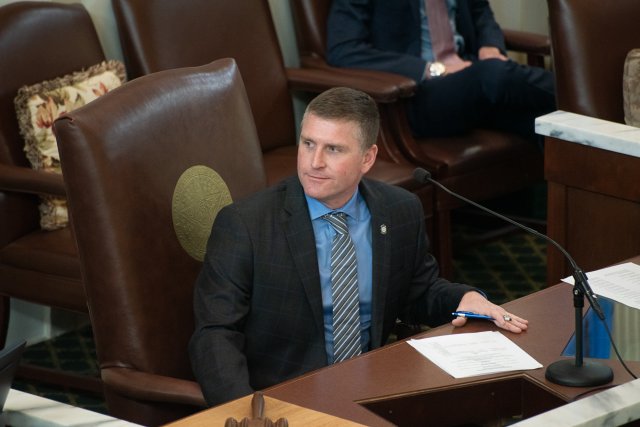

The Oklahoma Ethics Commission has settled a lawsuit against a Virginia-based political action committee that spent more than $150,000 in multiple Republican Oklahoma legislative races in 2018 as part of an electoral effort participated in by a top GOP House leader to defeat several hardline members of his own caucus.
The Conservative Alliance PAC and its treasurer, Chris Marston, admitted it targeted specific Oklahoma candidates and failed to follow the disclosure requirements in Oklahoma law.
CAP and Marston, a resident of Virginia, agree to pay $45,000 within 30 days to the state, according to the settlement announced Friday. The figure represents a compromised amount of the total fines and fees that could be levied for violations of Oklahoma ethics rules, including for failure to file reports and failure to include appropriate disclosures on independent expenditures.
Records indicate that the Conservative Alliance PAC informed the Federal Election Commission that it had a little more than $1 million in operating expenditures in 2017-18. Those included $206,025 spent in Oklahoma. Most of that money was used to help finance campaigns against incumbent House Republicans who were deemed to be hard-liners against tax increases and opposed measures seeking new revenue sources to pay for teacher pay raises in an effort to thwart the teacher walkout in 2018.
Rep. Chris Kannady, who now serves as the chairman of the powerful House Committee on Judiciary – Civil, acknowledged to reporters in 2018 that he helped launch the attack on his own colleagues.
Part of his frustration stemmed from far-right House Republicans’ refusal to vote for increased tax revenues needed to balance the state budget and pay for a historic teacher pay raise that year.
“This group, all they really knew was the red button,” Kannady (R-OKC) told The New York Times. “They voted against everybody’s issues. (…) Once you cut out the cancer that was attacking us, we’re now in a position to heal and move forward. We are now unified as one.”
Similarly, Kannady told The Associated Press that the last straw came when some of the Republican hardliners called publicly for more conservative challengers to run for office. The situation created a “Civil War” in the GOP Caucus following a verbal and physical confrontation between one of Kannady’s closest political allies, Rep. Josh West (R-Grove) and then-Rep. Mike Ritze (R-Broken Arrow), who was later removed from membership in a veterans’ group owing to questions about allegedly stolen valor.
Kannady told the AP in 2018 that he didn’t know who the principal figures running the Conservative Alliance PAC were.
“All I did was have conversations with people and set things in motion, to say that this situation has to be addressed,” he told the AP.
Contacted Monday by NonDoc, Kannady had little response to a variety of questions about the Ethics Commission settlement and his involvement with CAP. He denied knowing Marston.
Asked how he got connected with the Conservative Alliance PAC, Kannady replied, “It’s politics.”
Kannady is not mentioned in the settlement agreement between CAP and the Ethics Commission.
“Our settlement agreement, the people involved, are all listed between the petition and our settlement and Rep. Kannady is not listed,” Oklahoma Ethics Commission executive director Kemp said to NonDoc on Monday.
Of the $45,000 settlement, $40,000 is to be paid to the Oklahoma General Revenue Fund and $5,000 is to be paid to the Ethics Commission to satisfy compliance orders for failing to file timely quarterly reports, annually renew registration and file a final report, according to the settlement.
CAP, listed as being based in Alexandria, Virginia, and Marston also agreed to file within 30 days all outstanding quarterly reports of contributions and expenditures and all pre-election reports detailing independent expenditures CAP made regarding Oklahoma’s 2018 election cycle, the value of those independent expenditures and the candidate whom those independent expenditures supported or opposed. It filed a termination report with the FEC in August 2019.
When that information is received, the Ethics Commission will dismiss its lawsuit with prejudice, meaning it will not refile the same claim. The investigation into CAP will be concluded once CAP fulfills the terms of its settlement agreement, said Kemp.
The settlement resolves the first-ever lawsuit in Oklahoma against an out-of-state political action committee that sought to influence Oklahoma elections but refused to follow Oklahoma law on disclosure, she said.
“With campaign advertising by PACs, corporations, and dark money groups hitting record levels, transparency in campaign finance activity has never been more important. Oklahomans expect to be able to identify who is advocating for or against the candidates on the ballot before they go vote,” Kemp said in a press release. “The disclosure laws are not difficult and convey important information to the voter who must decide how much weight to give to a message contained in a campaign ad.”
A call to an attorney representing the PAC was not returned prior to the publication of this article.
CAP never filed spending reports in Oklahoma
Five state representatives lost in the 2018 Republican primary and six more lost in the Republican runoff. The Conservative Alliance PAC’s attack ads helped influence the outcomes, but CAP never reported to the Ethics Commission the candidates it was supporting or opposing or how much it was spending. It also omitted its address on its campaign ads, allegedly to mislead voters that it was an Oklahoma-based PAC.
It registered with the Ethics Commission in August 2018 as a PAC supporting conservative candidates but did not file anything else with the state.
CAP reported to the Federal Election Commission that it received $1,021,000 in contributions in 2018 between April 2 and Oct. 19. All of those funds were received from one donor: Prosperity Alliance Group, an organization based in Washington, D.C. Before CAP’s efforts in Oklahoma, the Conservative Alliance PAC had played in Ohio legislative races following similar financial support from Prosperity Alliance Group. In 2019, a national watchdog group asked the IRS to investigate Prosperity Alliance Group.
FEC records show that the Conservative Alliance PAC spent $206,025 in Oklahoma in 2018, mostly to help finance campaigns against incumbent House Republicans. Disbursements between June and August of that year included $59,292.04 to Advocacy Insight LLC in Oklahoma City, which appears to be inactive, for fundraising expenses, and $36,382,79 to Campaign Advocacy Management Professionals LLC — or CAMP — in Oklahoma City for expenses listed as “other.”
CAMP is run by longtime Oklahoma political consultant Fount Holland, whose connections to leadership of the Oklahoma House run deep. In 2018, Ethics Commission records indicate that Kannady used CAMP for “campaign consulting” on his own reelection bid. Holland has also been a longtime consultant for House Speaker Charles McCall (R-Atoka).
The Ethics Commission said in its lawsuit, which was filed in June 2022, that the Conservative Alliance PAC failed to file reports of independent expenditures and include proper disclosures and documents upon request.
“For those in the political arena who take the time to know and follow the campaign finance laws in Oklahoma — your actions promote trust in fair campaigns and we thank you for your efforts,” Kemp said in her press release. “For those who deliberately choose to ignore inconvenient requirements, or to manipulate the requirements for personal purpose, the Commission and its staff will do what it can to hold you accountable to the extent resources allow.”
Separate case settled against former state senator
The Oklahoma Ethics Commission on Friday also approved a settlement with the campaign committee for former state Sen. Marty Quinn (R-Claremore). His state campaign committee made a $10,000 contribution to a federal political action committee supporting his own unsuccessful bid for the 2nd Congressional District seat in 2022. Under ethics rules, candidate committees are unable to make contributions to PACs.
Quinn, a Republican from Claremore, agreed to pay $1,000 to the State General Revenue Fund within 30 days. The penalty is for allowing his state candidate committee, Friends of Marty Quinn 2018, to make the contribution in June 2022 to the federal PAC, Quinn Works PAC.
Quinn was seeking the District 2 congressional seat last year that had been vacated by Markwayne Mullen, who sought and won the U.S. Senate seat held by Jim Inhofe, who did not seek reelection. Quinn was elected to the Oklahoma House of Representatives in 2010 and was elected to the State Senate in 2014. He could not seek reelection in 2022 because of the 12-year legislative term limits.




















